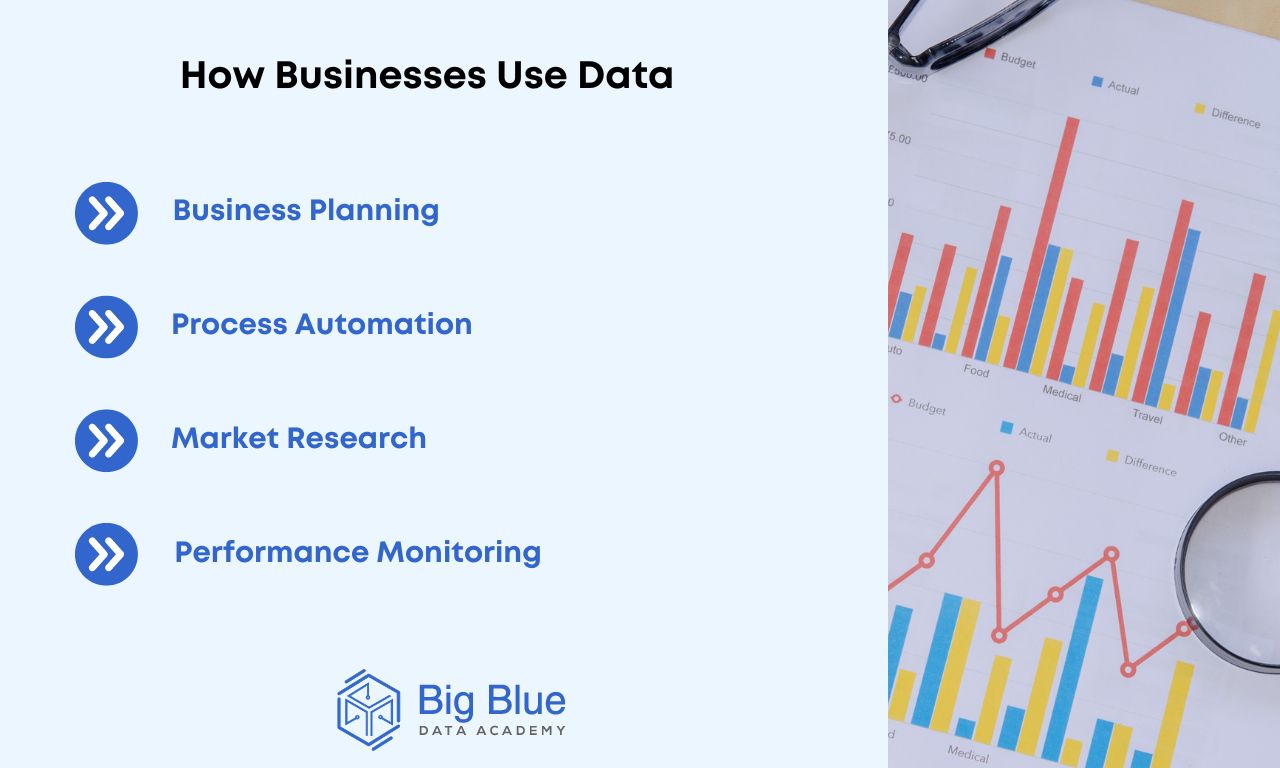How Businesses Use Data (2023 Guide)
Data is a critical source of knowledge for every business in today's era.
Business data can significantly aid the efforts of a company to learn more about its customers' desires, in order to provide even better service, increase its profits, and surpass competition.
In this article, we will explore:
What we define as business data
Why data is important for businesses
How businesses utilize data
Let's begin with a fundamental definition.
What Are Business Data?
Business data is a set of information related to a business and its various activities.
These pieces of information can encompass statistical data, raw data analytics, sales numbers, and expenses, among others.
Businesses employ various methods to collect data, such as surveys, polls, and especially web scraping in cases of collecting large volumes of data (big data).
The collection of qualitative and big data can assist both large and small businesses in streamlining operations and making critical decisions more effectively.
Continuing, let's delve into why data holds utmost significance for businesses.
Why Data is Important for Businesses
Data is particularly vital for businesses for the following reasons:
Reason #1: Decision Optimization
As previously mentioned, data can help a business make better and more methodical decisions.
Through the collection and analysis of substantial data volumes, a company can promptly make critical decisions, better comprehend the benefits, as well as the repercussions of its choices.
For instance, if a company considers expansion into a new market or country necessary, data collection becomes pivotal.
This is because gathering information about market operations, the type of consumer base the product or services can serve, and overall positioning in the new market becomes imperative.
Reason #2: Enhancing Customer Satisfaction
Enhancing customer satisfaction can contribute to improved loyalty and trust towards a company, which can lead to increased sales and overall profit.
Moreover, by utilizing data, businesses can assess the effectiveness of their efforts, providing a more personalized experience tailored to each customer's needs.
After all, the more satisfied customers a business has, the more likely they are to spread a positive reputation for the company, helping it stand out from the competition.
Reason #3: Increasing Revenue and Reducing Costs
Data can assist businesses, such as marketing or retail companies, in measuring whether a product or service is profitable by utilizing various KPIs.
It helps determine if revenues exceed expenses or if costs ultimately outweigh the gains.
Through the collected data, a company can pinpoint areas to cut costs and allocate resources more efficiently.
Now that we've discussed the importance of data for a business, let's explore how businesses utilize data.
How Businesses Utilize Data
Businesses of all sizes use big data for purposes such as market research and process automation, among others.
Next, let's take a more detailed look at certain cases and uses of data by companies:

Use Case #1: Business Planning
Thoroughly studying the strategy a company will ultimately pursue is pivotal for its trajectory.
Through data and various tools used for predictive analysis, forecasts and trends can be generated to implement a strategic and well-researched business planning, mitigating risk.
Data teams within a company play a crucial role in this area, as their technological expertise in data analytics and AI can identify recurring patterns through analysis, shedding light on market fluctuations and the necessary course of action.
Use Case #2: Process Automation
In today's fast-paced world, time is money for businesses.
It's not uncommon for many companies to waste valuable time on repetitive tasks.
The solution lies in automation.
Working together with other team members, data scientists can identify workflow automation opportunities using AI and Machine Learning, reducing human involvement.
For instance, AI-powered digital assistants can be highly effective in summarizing, categorizing, and retrieving documents and customer interactions.
Additionally, various automation tools can be utilized in the hiring process.
With these tools, a company can automatically sort resumes and filter out candidates who do not match the required qualifications for a specific job position.
Use Case #3: Market Research
In the past, a widely used method for collecting data for marketing and market research purposes was focus groups.
However, with big data, available data science and data analytics tools are yielding highly effective results at a lower cost.
Specifically, Web Scraping, the automatic extraction of data from the internet, is a particularly popular method in the field of marketing.
By collecting data based on customer behavior, a company's business analysts can draw relevant conclusions.
For example, a company can monitor its own price developments through collected data and implement more effective pricing strategies.
Use Case #4: Performance Monitoring
Most business intelligence and data analytics tools enable the creation of customized reports based on specific business goals. For example, a company can uncover significant insights about employee productivity through collected data.
Subsequently, these insights can be used to set performance goals for employees. Furthermore, a company can monitor the performance of a marketing campaign through data.
The findings might reveal that a certain portion of the marketing budget allocated to social media campaigns isn't generating appropriate potential customers.
Based on this information, the company can make informed decisions about reallocating resources elsewhere.
In Summary
We've thoroughly examined what business data is, why it is important, and how companies utilize it.
Skills in the field of data science are particularly critical for a business's evolution in today's competitive environment.
If you are enthusiastic and want to learn more about this promising field, follow us for more educational articles.


.jpg)